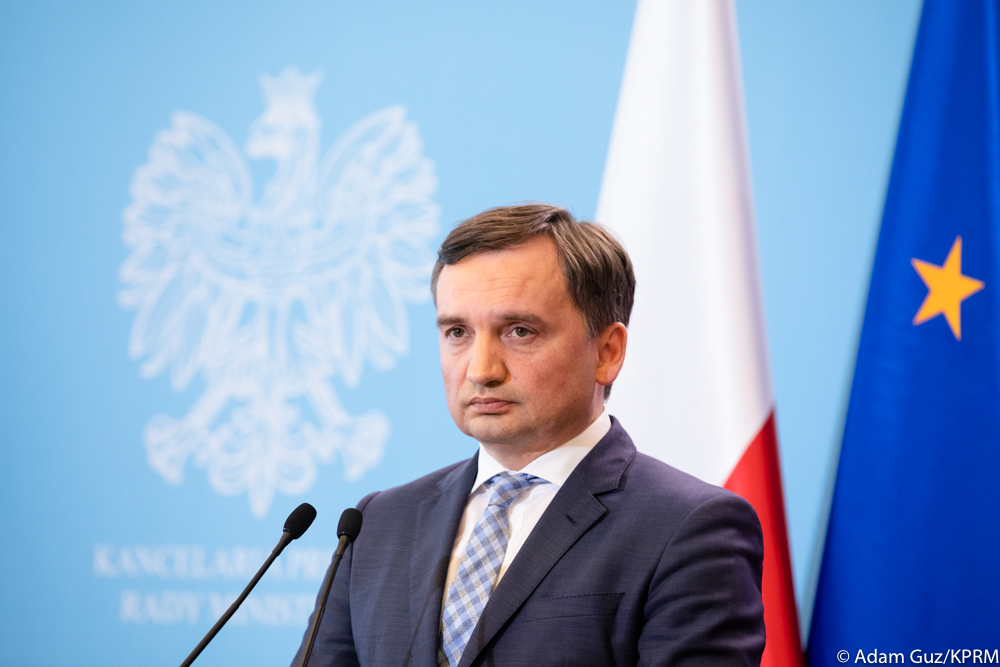The government had made a “mistake” in dropping its veto of the EU budget and coronavirus recovery plan, according to Zbigniew Ziobro, the justice minister and leader of a junior partner in Poland’s ruling coalition. His announcement has led to renewed speculation about the future of the government.
The prime minister, Mateusz Morawiecki, insists he has been successful in negotiating an agreement that provides “stronger guarantees” that Poland will be protected from use of the budget’s rule-of-law mechanism. A deputy foreign minister has called on Ziobro to “act responsibly”.
The justice minister’s party, United Poland (Solidarna Polska), is the most hardline of the three that make up the government. It has been pushing strongly for a veto of the budget, with Ziobro saying the rule-of-law mechanism would lead to Poland’s “enslavement”.
After Poland and Hungary last night agreed to drop their veto, Ziobro responded with a statement condemning the decision. He said that the concessions made to Poland and Hungary by other national leaders at the European Council are not legally binding, and that agreeing to them was a “mistake”.
The European Commission would now be able to make “arbitrary, political and ideological” decisions on the disbursement of funds, he warned. This would allow it to “interfere” in domestic affairs, thereby significantly impacting on “Polish sovereignty”.
Ziobro announced that the management board of United Poland would be holding a meeting “to discuss the consequences of the decision made at the [European Council] summit”.
This year, his party has been an increasingly rebellious member of the ruling coalition, though those differences appeared to have been settled with the announcement of a reshuffled government in September.
In response to Ziobro’s remarks, deputy foreign minister Paweł Jabłoński told the Polish Press Agency (PAP) that “greater reflection is called for” and that he “hopes United Poland will act responsibly”.
“If we were able to agree with our opponents in other EU countries, we should all the more be able to agree with our own coalition partners,” said Jabłoński.
Politicians from government circles told Wirtualna Polska off the record that Ziobro has “overplayed” his hand. They say that Jarosław Kaczyński – the ruling coalition’s dominant figure – has “made clear that the prime minister has his blessing in Brussels”.
"Ziobryści przeszarżowali, dymisji premiera nie będzie, a Kaczyński zamknął temat. Teraz chcą ratować twarz" – mówi WP polityk z KPRM. W tle unijnych negocjacji w Polsce trwa jednak walka o kształt koalicji.https://t.co/ozkJ2coVL9
— Marcin Makowski (@makowski_m) December 10, 2020
The long-term budget, due to come into effect next year, includes a link between the disbursement funds and a clause on democratic criteria. The mechanism led Poland and Hungary to threaten to veto the budget, but both formally agreed to back down on Thursday night.
The budget is also attached to a €750 billion coronavirus recovery fund, which EU leaders reportedly threatened to push ahead with without Poland and Hungary onboard earlier this week.
Both Polish and Hungarian leaders hailed the conclusions of the European Council summit on Thursday as a victory. “We have much stronger guarantees than we had two weeks ago, this is the result of negotiations,” said Morawiecki. “The budget negotiations have produced a very good result, a very good budget.”
Polish Brussels correspondent: "The conclusions aren't legally binding, but – as long as they don't violate EU rules – are binding on the actions of the EU due to the stature of the European Council, for which they're a political obligation, an agreement" https://t.co/cTUI5BZ32z
— Notes from Poland 🇵🇱 (@notesfrompoland) December 10, 2020
“Congratulations to Mateusz…and congratulations to myself,” said Hungary’s prime minister, Viktor Orbán, quoted by Politico. He added that the two countries had “stood up to blackmail”, reports PAP.
Jabłoński insists that the European Commission will have to abide by the “legal obligation” agreed by the council. “The conditionality mechanism will be limited to situations where there is a real threat to the EU budget, i.e. where there are cases of financial misconduct, corruption, extortion,” he said.
“That is what mattered to us from the beginning: specific cases, and not abstract, general terms. That was dangerous, and that’s what we avoided,” he told PAP.
Main image credit: Adam Guz / KPRM (public domain)

Maria Wilczek is deputy editor of Notes from Poland. She is a regular writer for The Times, The Economist and Al Jazeera English, and has also featured in Foreign Policy, Politico Europe, The Spectator and Gazeta Wyborcza.




















